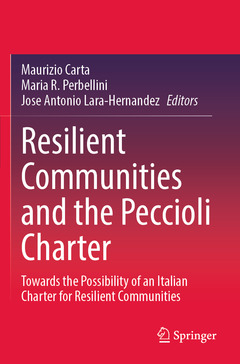Description
Resilient Communities and the Peccioli Charter, 1st ed. 2022
Towards the Possibility of an Italian Charter for Resilient Communities
Coordinators: Carta Maurizio, Perbellini Maria R., Lara-Hernandez Jose Antonio
Language: English
Subject for Resilient Communities and the Peccioli Charter:
Publication date: 04-2023
275 p. · 15.5x23.5 cm · Paperback
Publication date: 04-2022
275 p. · 15.5x23.5 cm · Hardback
Description
/li>Contents
/li>Biography
/li>Comment
/li>
The second part of the book presents mini-essays discussing the strategic points of the paper, and enabling more casual readers with the ability to access information on urban resilience. The book then explores urban resilience through the work and understanding of the institutions responsible for regulating the professions of urban planner, educators, professionals, and those involved in communication.
Providing numerous illustrations and examples, Resilient Communities and the Peccioli Charter will be of interest to researchers, postgraduates, architects, urban designers and planners alike.
Offers a guide to urban resilience from a rigorous academic and real-world perspective
Gathers salient features of urban resilience into a charter
Explores the urban resilience through the viewpoint of decision makers and regulatory institutions




